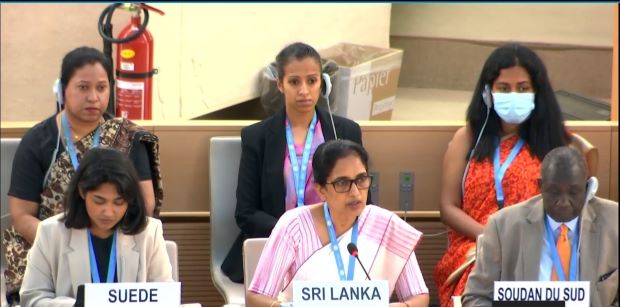Sri Lanka reject UN report asking more be done to probe rights abuses
COLOMBO – Sri Lanka has rejected the report presented by United Nation’s Human Rights High Commissioner requesting the government to do more to speed up the probe and prosecutions over the alleged past human rights abuses in the island nation.
The UN in its report presented at the 54th regular sessions of the Human Rights Council in Geneva said Sri Lanka should do more on governance, transparency, and accountability. Despite strong protests by Sri Lanka, the South Asian island nation is under an external investigation over alleged war crimes and rights abuses of religious minorities – among many others.
“The report recommends that the government accelerate investigations and prosecutions in emblematic cases of human rights violations, including the Easter Sunday bombings, in compliance with the international human rights standards,” Nada Al-Nashif, the UN Deputy High Commissioner told the forum while reading the latest update on Sri Lanka.
Sri Lanka faced an economic crisis which led to an increase in poverty, malnutrition, a health crisis, and a default of sovereign debts.
Sri Lanka has rejected many facts in the latest report citing that its content “does not reflect the actual ground situation in Sri Lanka”.
Himalee Arunatilaka, Sri Lanka’s Permanent Representative to the UN in Geneva said it was regrettable that the Office of the United Nations High Commissioner for Human Rights (OHCHR) has chosen to ignore the democratic resilience of the country and its institutions demonstrated in the past year, especially after a protest movement changed the government.
“Sri Lanka reiterates its deep concerns regarding the ever-increasing mandate of the OHCHR in making sweeping and intrusive comments on all aspects of economic, financial, electoral, political, domestic, budgetary and development policies,” Arunatilaka said in her response, articulating Sri Lanka’s strong objection to the written update pronouncing on policy matters, which she said were “essentially domestic for any sovereign country and outside the framework of this Council”.
Deeming the comments “unhelpful”, she said, “In its simplistic analysis, the OHCHR also refers to the challenges Sri Lanka is currently facing in the food, health and nutrition and education sectors as if it is an isolated phenomenon affecting Sri Lanka alone.”
She noted that in parallel in New York, the UN Secretary General, in solidarity with developing Member States in debt and financial distress arising from the current global context, is highlighting sympathetically the severe setbacks and challenges encountered by all developing countries in achieving the SDGs.
Arunatilaka said Sri Lanka rejects all conclusions and recommendations including references to targeted sanctions as they are based on incorrect and unsubstantiated sources contravening the principles of natural justice and the principles of universality, impartiality, objectivity and non-selectivity.
Sri Lanka has been consistently rejecting all the allegations of its past human rights violations in the final stage of a 26-year war that ended in 2009. However, analysts say impunity and failure to implement rule of law in a fair manner have led to more rights violations including suppression of activists, ethnic and religious minority, and anti-government protesters.
Successive governments have taken several steps in line with the past UN recommendations, but the OHCHR has repeatedly said they were not enough.
Arunatilaka said President Ranil Wickremesinghe government has been progressing with the post-war reconciliation efforts while it has passed a new anti-corruption law, proposed a new anti-terrorism bill to replace the existing Prevention of Terrorism Act (PTA), independent domestic mechanisms, and the establishment of Interim Secretariat of the Truth and Reconciliation Mechanism as some measures taken to address the UN concerns.
She assured Sri Lanka will continue to engage constructively with the UN and its agencies, in keeping with domestic priorities and policies as well as the international obligations voluntarily undertaken.
-ENCL/EN



Comments are closed, but trackbacks and pingbacks are open.